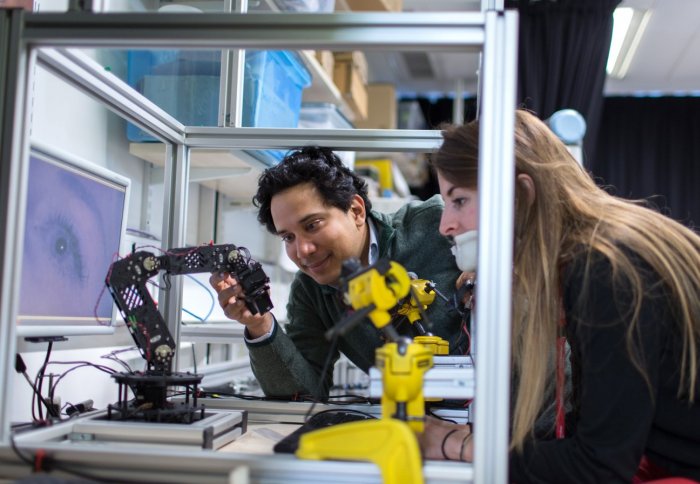Imperial team to compete in international bionic sporting championship
by Colin Smith

Dr Aldo Faisal, Imperial Team Captain, and student Marta Garnelo
Imperial team announce today that they are going for gold in the Cybathlon, an international sporting event held in Switzerland next year.
In 2016, spectators will converge on the Kopling Arena in Zurich to watch us take part in the Cybathlon, which will truly be the first bionic Olympics in the world.
– Dr Aldo Faisal
Departments of Bioengineering and Computing
The Cybathlon, dubbed the “bionic Olympics”, is an inclusive event that will enable people living with disabilities - who have until now been unable to participate in sports – to compete in a range of challenges, with the aid of the latest assistive technologies. The Cybathlon, held in Zurich in October 2016, will see Imperial, universities and industrial partners from around the world competing. The ultimate aim is to use the championships as a platform to further develop assistive technologies that are useful in daily life for people living with physical disabilities.
Team Imperial will consist of scientists and students from the Departments of Bioengineering and Computing, along with industrial partners. Similar to Formula One racing, the Imperial researchers and students will act as the pit crew, assisting their parathlete team mates, called pilots, to compete. Over the course of 2015, the academics and students will work alongside pilots to develop, test and refine their assistive technologies in preparation for the competition.
Machine interface
The pilots will be using a range of devices to help them to compete including battery powered knee prostheses, which will help pilots to walk. The team are also augmenting wearable arm prostheses, which will be connected to the pilot via electrodes, responding to commands via electrical brain impulses. They will also be refining exoskeleton technology, which wrap around a pilot’s body and assist them to move their legs. Other devices under development include powered wheelchairs and devices that electrically stimulate muscles to assist with body movements along with new types of technologies that interface with the pilot’s brain so that they control devices through thought.
The challenges
Team Imperial are aiming to compete in a range of sports including the arm prosthetic race, where pilots hold a hoop in their prosthesis while navigating through a charged wire circuit, with points being deducted if the hoop touches the wire. They will also take part in the brain computer interface challenge, where a pilot wears a cap with electrodes, which reads their mind, via electrical brain impulses, to successfully navigate a 3D computer game to win. Other challenges include the legs prosthetics race, powered exoskeleton competition and the powered wheelchair challenge, where pilots have to navigate a range of difficult obstacle courses, with the best times winning.
Dr Aldo Faisal, Team Captain from the Departments of Bioengineering and Computing at Imperial, said: “It is such a powerful feeling knowing that the assistive technologies we are developing will help our team mates to compete in sports for the first time. In 2016, spectators will converge on the Kopling Arena in Zurich to watch us take part in the Cybathlon, which will truly be the first bionic Olympics in the world. We are really excited to be a part of this major sporting event and we hope team Imperial will propel the UK to medals glory.”
Teams that have so far signed up to the Cybathlon include those coming from Switzerland, the Netherlands, Germany and the USA. Two medals will be awarded to teams for each competition, one for the pilot, who is using the assistive devices, and one for the scientists and students who have developed them. The event is organized on behalf of the Swiss National Competence Center of Research in Robotics.
The Pitt Crew
Team Imperial will also be led by Drs Spyros Masouros, Etienne Burdett and Ian Radcliffe, who are experts in neurotechnology, human robotics and assistive sporting technologies. The College is currently recruiting pilots and those interested should contact Dr Radcliffe for more information. The team is supported by the Sports Innovation Challenge at Imperial.
Imperial Festival
Members of the public can learn more about the Cybathlon at the Imperial Festival, which showcases the best in science and arts. Dr Faisal and team members will be on hand in the robot zone, showcasing some of the assistive technologies that they are developing for the competition.
Article text (excluding photos or graphics) © Imperial College London.
Photos and graphics subject to third party copyright used with permission or © Imperial College London.
Reporter
Colin Smith
Communications and Public Affairs